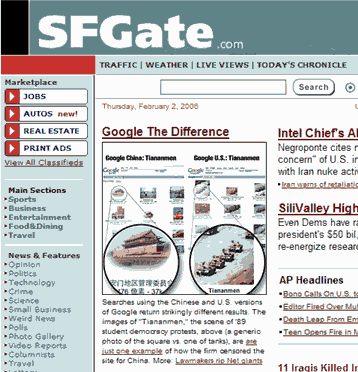 We're watching the media go to battle with it's future self. Editors who use their deep analytical processing capabilities and expensive liberal arts educations are lashing out at the man-made machines built by their antisocial computer science adversaries.
We're watching the media go to battle with it's future self. Editors who use their deep analytical processing capabilities and expensive liberal arts educations are lashing out at the man-made machines built by their antisocial computer science adversaries.They couldn't win the battle on cost. They couldn't win the battle on efficiency. They've even been losing the battle on relevance. But now they found a place where the editorial voice cannot be replaced...ethics. But to be sure it wasn't the machines who made the decision to cooperate with Chinese policy. It was the stockholders and two young billionaires who might be getting in over their heads.
Michael Malone articulates the big picture challenge for expanding Silicon Valley companies nicely:
"Small, fast-moving companies typically don't have to worry about the
larger cultural and geopolitical impact of their decisions, and when
they do, they can actually incorporate ethical analysis into the
process. Large corporations rarely do this, partly because the new
product or business decision-making is pushed down through the
organization and is rarely touched by senior management, and partly
because the goal stops being that of changing the world and becomes
that of hitting revenue targets."
The threat to media is not the machines. The threat to media is money. The current economic models of Old Media are not going to survive.
Now that Google is starting to look a little more like one of them, it's a lot easier to know where to aim the gun. But I would spend more time looking at how to recapture the trust, imagination, creativity, curiosity and thirst for human connection that people want. The money will come back. And then editors can wrestle with their own bosses over how to handle increasing demands from stockholders to show growth while huge opportunities in places that don't respect the same cultural priorities beckon them with cash rewards.
Trackbacks:
TrackBack URL:
http://www.mattmcalister.com/blog/_trackback/1741285
